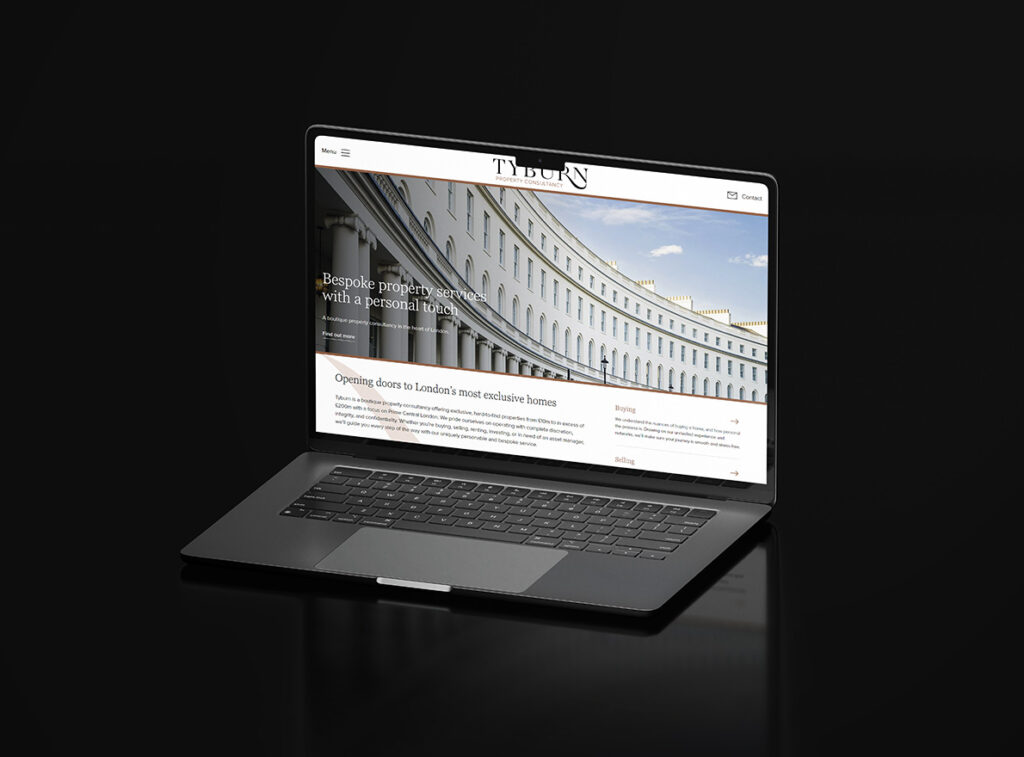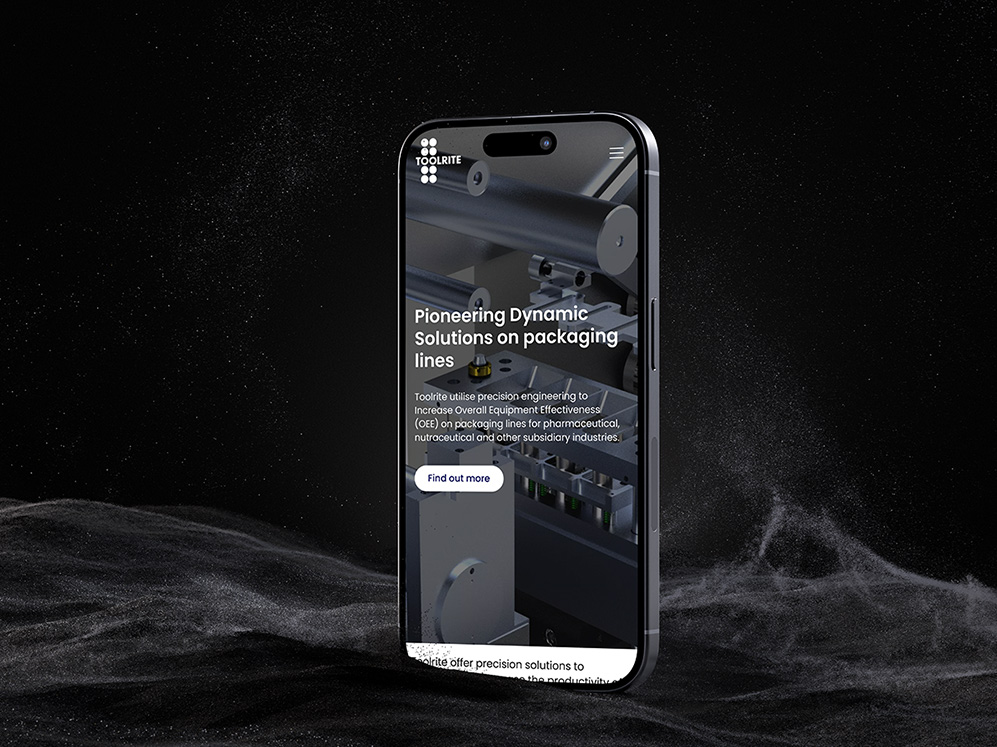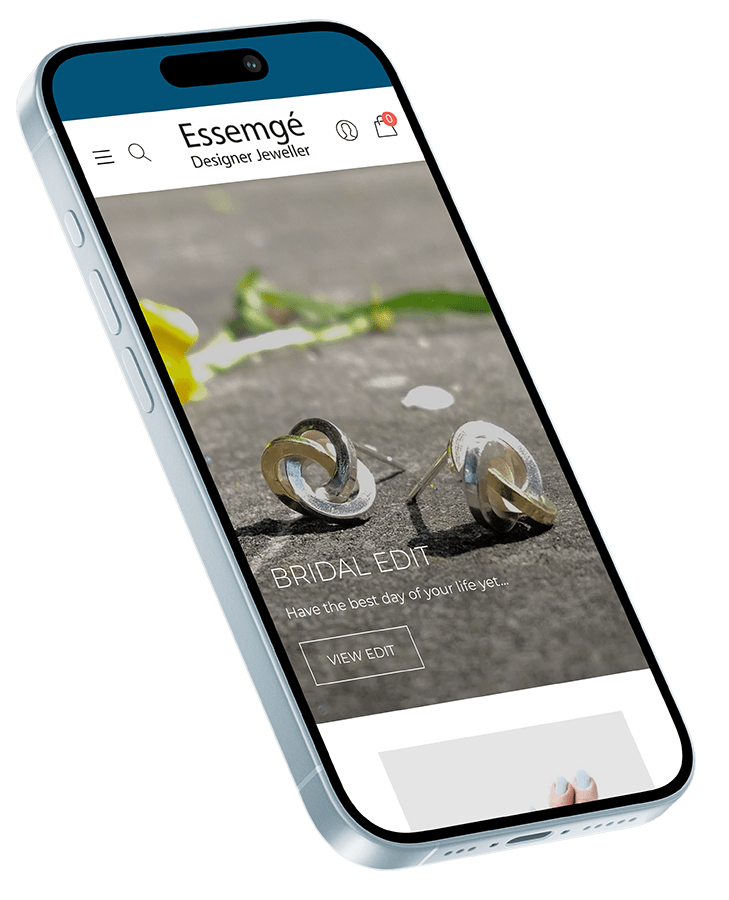Award-winning website design in London
Our London website design agency integrates artificial intelligence to create outstanding websites that boost our clients’ online presence.


WEB DESIGN LONDON
Professional London web design agency
We offer a cutting-edge approach to crafting visually stunning and functionally robust websites tailored to meet the unique needs of businesses. By using artificial intelligence and the latest design trends, our team of experts ensures bespoke and professional London web design services.
We set our London website design agency apart by offering a personalised approach to meet the unique requirements of each client, empowering businesses to stand out in today’s digital landscape.
Top London website design agency
With a commitment to excellence, our London website design agency empowers businesses to make a lasting impact in the digital landscape, fostering a strong online presence and driving success in an ever-evolving market.
Bespoke London web design
Crafting unique, visually stunning websites tailored to your business.
WordPress web design
Using the power of WordPress to create websites that align with your brand.
Ecommerce websites
Developing dynamic online stores for an unparalleled shopping experience.
Custom development
Our custom development services ensure a competitive edge in the digital realm.

Cost-effective London web design services
We take immense pride in offering cost-effective website design without compromising on quality. Our London website design agency is committed to delivering value is ingrained in every aspect of our website design process, ensuring that businesses of all sizes can access cutting-edge web solutions tailored to their unique needs.
- We are transparent with our pricing at all times
- Tailored web solutions to match your business' needs
- Streamlining design thanks to innovative AI
Start your web project
Want to boost your digital presence and attract more customers to your business? We’d love to hear from you.
Our Website Design Process
Our website design process ensures a seamless and efficient approach from idea to website launch.
Initial consultation
We get to understand your business, target audience and goals for the website design project.
Project scope
Having established your goals, we agree on a scope for the project and the steps that we need to take to get there.
Design planning
We start to look at the design of your website, planning its structure, functionality and look and feel.
Design commences
We then work on a first-draft of your website's design to show you what we've been working on.
Revisions
Feedback is discussed and then implemented during rounds of revisions to ensure the quality of your new site.
Development
We start developing onto your chosen CMS platform, focusing on responsive and user-friendly development.
Content
At this stage, we ask our clients to start to look at the content and imagery for their new site.
Integrations
We'll also look at any integrations that need to be developed into your site including tracking, email marketing and security.
Once the majority of your website has been developed, we will automate your site so that it becomes streamlined.
Testing
Before we start thinking about pushing the go live button, thorough testing of your website takes place.
Launch
When everyone is happy with the new website, we push the go button and the site is launched to the world.
Trusted London website design agency for many great brands
Conversion-driven
We design websites with lead conversion in mind, leading your target audience to take action.
Boosted by animation
Our websites are enhanced by animation and interactions to boost user experience.

Range of integrations
Through WordPress and custom development, we can integrate your website with your chosen software.
SEO optimised
We will optimise your site to a standard SEO level so that it is ready to tackle search engines.
What we focus on
Our values help us to creative outstanding and innovative website design solutions, adding value with every project.
Personal approach
We provide a down-to-earth service where we get to know what you are looking to achieve from your website.
Transparency
We are transparent throughout the website design process to ensure that everyone is on the same page.
Integrating AI
We are not just crafting websites; we are crafting digital experiences by combining the power of AI with the finesse of our human touch.
London Web Design Frequently Asked Questions
How much does a website cost in London?
Determining the cost of a website involves considering various factors that influence its complexity, functionality, and design. For a basic website with standard features, we’d say that you are looking at something in the region of £500-750 from a common London website design agency. This type of site is suitable for small businesses or individuals looking for a straightforward online presence.
For more dynamic websites, like those with interactive elements, multiple pages, or ecommerce capabilities, the cost can increase. This category includes content management systems (CMS), custom designs, and features tailored to specific business needs.
Complex and custom-built websites, particularly those requiring intricate designs, advanced functionalities, and unique development, typically cost more than basic websites. These projects often involve extensive planning, custom coding, and specialised integrations, making them suitable for larger businesses with specific requirements.
It’s important to note that ongoing costs, such as domain registration, hosting fees, and potential maintenance expenses, contribute to the overall expenditure. Additionally, factors like responsive design for mobile compatibility, search engine optimisation (SEO) considerations, and the need for content creation or migration can influence the final cost.
To obtain an accurate estimate, our London web design agency can assess your specific needs, discuss functionalities, and provide a detailed quote that aligns with your budget constraints. Transparency about your objectives, target audience, and desired features will help ensure that the proposed cost reflects the value and effectiveness of the website for your business.
Do you design websites with only AI?
We do not solely rely on artificial intelligence (AI) to design your website. While AI plays a pivotal role in enhancing the efficiency and intelligence of our website design process, we firmly believe in the irreplaceable value of the human touch in crafting unique and compelling digital experiences.
Our approach is a harmonious collaboration between AI and our skilled team of designers. We recognise that the essence of a brand goes beyond algorithms and requires a deep understanding of human emotions, creativity, and expert design principles. As a result, our team actively engages with clients, working closely to grasp the vision and identity of their brand. We leverage AI as a powerful tool to streamline processes, analyse data, and adapt websites dynamically based on user behavior.
The role of AI in our services is multifaceted. AI assists in automating repetitive tasks, analysing vast amounts of data to derive meaningful insights, and optimising elements for a personalised user experience. However, the creativity, intuition, and design finesse come from our experienced designers who bring a human perspective to the process.
The synergy between AI and our team ensures that your website not only reflects the latest technological advancements but also embodies the authentic spirit of your brand. From conceptualising sleek and modern designs to incorporating interactive features, our team combines AI’s analytical capabilities with the creative instincts of our designers.
In essence, while AI is a valuable tool, we understand the importance of the human element in crafting a website that is not only visually stunning but also resonates with your audience on a deeper level. Our London website design agency embraces both innovation and creativity, ensuring that your website stands out in a digital landscape where the perfect blend of AI and human touch sets us apart.
What are the benefits of website design for London-based companies?
In the dynamic and competitive business landscape of London, a well-crafted website is not just a digital necessity; it is a powerful tool that can significantly impact a company’s success. From enhancing brand visibility to improving customer engagement, the benefits of a professional and reliable web design agency for London-based companies are multifaceted.
1. Global Reach and Local Appeal
A professionally designed website serves as a digital storefront that is accessible to a global audience. For London-based companies, this means expanding beyond local boundaries and reaching potential customers worldwide. A website allows businesses to showcase their products or services, making a compelling first impression that resonates not only with local clientele but also with an international audience.
2. Enhanced Brand Visibility and Credibility
A visually appealing and well-structured website contributes significantly to a company’s brand visibility and credibility. In a city as bustling as London, where competition is fierce, having a polished online presence helps companies stand out. A professionally designed website fosters trust among potential customers, instilling confidence in the brand and its offerings.
3. Local SEO Optimisation
London’s diverse and dynamic market demands a strategic approach to local Search Engine Optimisation (SEO). A well-designed website can be optimised for local search, ensuring that the company appears prominently in search engine results when potential customers in London are seeking relevant products or services. This boosts online visibility and drives targeted traffic to the website.
4. Mobile Responsiveness
A significant portion of internet users in London accesses websites through mobile devices. Responsive website design ensures that the site adapts seamlessly to different screen sizes and devices. This not only provides an optimal user experience but is also crucial for search engine rankings, as search engines prioritise mobile-friendly websites. A mobile-responsive design caters to the on-the-go lifestyle of Londoners, making it convenient for them to engage with the brand.
5. Effective Communication and Customer Engagement
A well-designed website acts as a powerful communication tool. It allows London-based companies to convey their brand message, values, and unique selling propositions effectively. Interactive elements, engaging content, and clear calls-to-action facilitate customer engagement. This not only strengthens the connection between the brand and its audience but also encourages potential customers to explore the website further and take desired actions.
6. Ecommerce Capabilities
For London-based companies involved in retail or providing products and services, an ecommerce-enabled website opens up new avenues for sales. A seamless online shopping experience, secure payment gateways, and efficient order processing contribute to increased revenue. With the convenience of online transactions, companies can tap into the ecommerce potential of the London market.
7. Data Collection and Analytics
Websites offer valuable insights into user behavior through analytics tools. London-based companies can leverage these insights to understand customer preferences, track website traffic, and measure the effectiveness of marketing strategies. This data-driven approach enables businesses to make informed decisions, refine their online strategies, and continually optimise the user experience.
8. Competitive Edge and Adaptability
In a city known for its fast-paced business environment, having a well-designed website provides a competitive edge. It showcases a company’s commitment to staying current with technology and meeting the evolving expectations of customers. Additionally, a website can be adapted and updated easily to align with changing market trends, ensuring that the company remains relevant and competitive in the London business landscape.
The benefits of a London website design agency for London-based companies are diverse and impactful. A strategically designed website not only enhances local visibility but also positions the company for global reach. It serves as a dynamic tool for effective communication, customer engagement, and staying ahead in a competitive market. As London continues to be a hub of innovation and commerce, a well-crafted website is an essential asset for companies aiming to thrive in this vibrant business environment.
What should you know before creating a website?
Before embarking on the journey to get a website, there are several key considerations to ensure a successful and effective online presence. Here is an overview of what you should know before building your website with a London web design agency:
- Firstly, clearly define your website’s purpose and goals. Whether it’s to showcase your portfolio, sell products, or provide information, having a clear objective will guide the design and functionality of your site.
- Understanding your target audience is crucial. Identify their needs, preferences, and behaviours to tailor the website to meet their expectations. A user-friendly design that considers the audience’s experience will enhance engagement and satisfaction.
- Research and select a suitable domain name that reflects your brand and is easy to remember. Ensure its availability and consider securing relevant social media handles to maintain consistency across online platforms.
- Choose a reliable web hosting service that meets your website’s requirements. Factors such as server reliability, storage space, and bandwidth are essential to ensure optimal performance.
- Consider the scalability of your website. Anticipate future growth and choose a platform that can accommodate expanding content, features, and traffic. Scalability is vital to avoid the need for a significant overhaul as your business evolves.
- Plan your website’s structure and navigation to create a logical flow for users. This includes organising content into categories, creating a clear menu structure, and ensuring easy navigation between pages.
- Prioritise responsive design to guarantee your website functions seamlessly on various devices. With a growing number of users accessing the internet via smartphones and tablets, responsive design ensures a positive experience across all screen sizes.
- Think about search engine optimisation (SEO) from the beginning. Incorporate relevant keywords, optimise images, and structure your content to enhance visibility on search engines, driving organic traffic to your site.
- Budget considerations are vital. Determine your budget for website development, domain registration, and ongoing maintenance. We are open with every client to find solutions that meet the business’ needs.
- Lastly, be aware of ongoing responsibilities. Regularly update content, monitor website performance, and address security concerns. Understanding the long-term commitment involved in maintaining a website ensures sustained success in the online landscape.
By considering these factors, you set the stage for a website that not only meets your immediate needs but also evolves with your business, effectively engaging your audience and contributing to your overall success in the digital realm.
Why is responsive web design in London important?
In the dynamic and bustling metropolis of London, where life moves at an accelerated pace and digital interactions are ubiquitous, the importance of responsive web design cannot be overstated. Responsive web design is not merely a trend; it is a fundamental necessity for businesses aiming to thrive in this vibrant city. Let’s delve into why responsive web design is crucial for London-based businesses:
1. Mobile-Centric Lifestyle
Londoners are known for their on-the-go lifestyle, relying heavily on smartphones and other mobile devices to access information on the fly. Responsive web design ensures that your website adapts seamlessly to various screen sizes, providing an optimal user experience across desktops, laptops, tablets, and smartphones. In a city where mobile usage is pervasive, a responsive website becomes a prerequisite for engaging with the fast-paced urban audience.
2. Search Engine Friendliness
Google and other search engines prioritise mobile-friendly websites in their rankings. Responsive web design not only enhances the user experience but also positively influences search engine optimisation (SEO). A website that is optimised for search engines increases its visibility among London’s competitive digital landscape, ensuring that potential customers can find your business easily.
3. Diverse Demographics
London is a melting pot of cultures, with a diverse population that brings a range of devices and preferences. A responsive website caters to this diversity by providing a consistent and user-friendly experience to people with different devices and screen sizes. Whether your audience is tech-savvy professionals or those less accustomed to digital interactions, a responsive design ensures inclusivity and accessibility for all.
4. Local Business Competitiveness
The competitive nature of London’s business scene demands that companies stay ahead of the curve. A responsive website not only meets user expectations but also positions your business as technologically adept and customer-focused. This can give you a competitive edge, especially in industries where the digital experience is a key differentiator.
5. Adaptability to Technological Trends
London is a city at the forefront of technological trends. From the latest smartphones to innovative gadgets, residents embrace cutting-edge technology. A responsive website not only aligns with current technological trends but also prepares your business to adapt seamlessly to future advancements. It’s an investment in the longevity and relevance of your online presence in the ever-evolving tech landscape.
6. Local Consumer Behaviour
Understanding and aligning with local consumer behavior is essential. Responsive design caters to the way Londoners consume content, browse products, and engage with businesses online. By providing a user-friendly experience that aligns with local preferences, your website becomes more appealing and accessible to the London consumer.
7. Enhanced User Engagement
A website that is easy to navigate and visually appealing on any device encourages users to stay longer and engage more. Whether it’s accessing information about your services, making a purchase, or filling out a contact form, a responsive design streamlines the user journey. Enhanced user engagement is crucial for businesses looking to capture the attention of the London audience amidst the myriad distractions of city life.
8. Local SEO Optimisation
Local search optimisation is paramount for businesses targeting a London audience. Responsive web design contributes to local SEO efforts by providing a consistent online experience. Google’s algorithms favour mobile-friendly websites, and a responsive design positively impacts your search rankings, making your business more visible to potential customers in London.
9. Ecommerce Convenience
For businesses involved in ecommerce, a responsive website is not just beneficial; it’s essential. Londoners appreciate the convenience of online shopping, and a responsive ecommerce site ensures a seamless and enjoyable shopping experience across devices. This can significantly impact conversion rates and contribute to the success of your online sales efforts.
10. Brand Trust and Perception
In a city where perception matters, your website is often the first point of contact with potential customers. A responsive design communicates professionalism, attention to detail, and a commitment to delivering a positive user experience. It builds trust and fosters a positive perception of your brand, crucial elements for success in London’s competitive business environment.
In the vibrant and dynamic city of London, responsive web design is not just a technical nicety; it’s a strategic imperative. It aligns with the lifestyle, preferences, and behaviours of the local audience, contributing to improved user experience, search engine visibility, and overall business success. As technology continues to evolve, businesses that prioritise responsive web design are better positioned to navigate the urban jungle and leave a lasting impression on the digitally savvy and diverse population of London.
How can London-based companies get the best out of their website?
In the vibrant and competitive business landscape of London, a compelling online presence is essential for success. A well-designed website serves as the digital storefront for your company, making it crucial to get the best out of the web design process. Here’s a comprehensive guide on how to achieve that with a web design London agency:
1. Understand Your London Audience
Begin by thoroughly understanding your target audience in London. Consider demographics, preferences, and cultural nuances. Tailoring your website design to resonate with the local audience enhances relevance and creates a connection that can drive customer engagement.
2. Prioritise Mobile Responsiveness
Londoners are often on the move, relying heavily on mobile devices. Ensure your website design is responsive, adapting seamlessly to various screen sizes. A mobile-friendly site not only improves user experience but also positively impacts search engine rankings, crucial for visibility in the competitive London market.
3. Local SEO Optimisation
Optimise your website for local search to ensure it appears prominently in search engine results when potential customers in London are looking for products or services you offer. Incorporate location-based keywords, create local content, and claim your Google My Business listing for enhanced visibility.
4. Reflect Your Brand Identity
Infuse your brand identity into the website design. From colour schemes to typography, ensure consistency with your brand elements. This builds brand recognition and reinforces a sense of trust and professionalism, essential in the business-savvy atmosphere of London.
5. Showcase London-Centric Testimonials and Case Studies
Highlighting testimonials and case studies from satisfied London-based clients can build credibility and trust. Potential customers in London are likely to resonate with success stories that reflect experiences within the local business context.
6. Incorporate Local Imagery and Landmarks
Use visuals that resonate with the local audience. Incorporate images of London landmarks, culturally relevant visuals, or scenes from local neighbourhoods. This not only adds a personal touch but also enhances the relatability of your website to your London audience.
7. Streamlined Navigation and User Experience
Londoners are accustomed to efficiency. Ensure your website has a user-friendly navigation structure, intuitive layout, and clear calls-to-action. A streamlined user experience encourages visitors to explore your site and facilitates smooth interactions.
8. Utilise Social Proof
Leverage social proof to build trust. Display customer reviews, ratings, and endorsements prominently on your website. Londoners, like any savvy consumers, are influenced by the experiences of their peers when making purchasing decisions.
9. Engaging Content Strategy
Develop a content strategy that aligns with your business goals and caters to the interests of your London audience. Regularly update your blog with relevant and engaging content. This not only enhances your website’s SEO but also positions your company as an authority in your industry.
10. Regularly Update and Evolve
The business environment in London is dynamic, and your website should reflect this dynamism. Regularly update your content, refresh your design, and stay abreast of industry trends. An evolving website demonstrates your commitment to staying relevant and meeting the ever-changing needs of your London customers.
In the bustling metropolis of London, your company’s website is an integral component of its identity and success. By understanding your audience, optimising for local search, and incorporating elements that resonate with the London culture, you can ensure your website not only stands out but also becomes an effective tool for attracting and retaining customers in this competitive market. Regular updates and a commitment to the evolving needs of your audience with a London website design agency will keep your London-based company at the forefront of digital excellence.
How long does a website take to design and build?
The timeline for designing and building a website can vary significantly based on several factors, including the complexity of the project, the features required, and the collaboration between the client and the website agency.
For a basic website with standard features and a template design, you will be looking at a 3 to 4 week timeline. This includes the initial consultation with the website design agency, planning, development, testing, and launch phases.
However, more complex websites, especially those with custom designs, intricate functionalities, or ecommerce capabilities, may take longer. Such projects could range from 2 to 6 months or more. The additional time is necessary for detailed planning, custom coding, integration of advanced features, and thorough testing to ensure a seamless user experience.
It’s important to note that the timeline provided here is a general guideline, and the specifics can vary from project to project. Therefore, having a detailed discussion with us, outlining your specific requirements and expectations, will provide a more accurate estimate tailored to your unique needs. Our London website design agency strives on providing a proactive approach, leading to a successful and timely website design and development process.
What affects how long a website takes to create?
As discussed, the timeframe for a London website design agency to build a website is influenced by various factors that collectively shape the complexity and scope of the project.
Project Scope and Complexity: The scale and complexity of the website significantly impact the time required. Basic informational websites can be built more swiftly, while complex ecommerce platforms or custom applications involve more intricate development processes.
Features and Functionalities: The number and complexity of features desired, such as user accounts, payment gateways, or interactive elements, contribute to the timeline. Advanced functionalities often require more time for development and testing.
Custom Design Requirements: Custom-designed websites with unique layouts, graphics, and animations generally take longer than those utilising pre-built templates. Customisation demands thorough planning and design iterations.
Content and Assets Availability: The availability and readiness of content, including text, images, and multimedia, play a crucial role. Timely provision of these assets by the client expedites the development process.
Client Feedback and Collaboration: Effective collaboration and timely feedback from the client are essential. Delays in decision-making or revisions can extend the project timeline. Active and open communication helps maintain a smooth workflow.
Ecommerce Integration: Websites incorporating ecommerce functionalities require additional time for setting up product databases, payment gateways, and ensuring secure transactions. The complexity of the online store impacts the overall timeline.
Regulatory Compliance and Security Measures: Compliance with regulations and the implementation of robust security measures take time. Ensuring the website adheres to legal requirements and follows best practices for cybersecurity is essential.
Responsive Design and Cross-Browser Compatibility: Building a website that is responsive across various devices and compatible with multiple browsers demands additional attention to detail. Testing on different platforms to ensure a consistent user experience extends the timeline.
Client Training and Documentation: If client training is included in the project scope, additional time will be needed for preparing documentation and conducting training sessions to ensure clients can manage and update their websites effectively.
Understanding these factors and discussing them transparently with our website design agency allows for a more accurate estimation of the project timeline. Flexibility, effective communication, and a collaborative approach contribute to a successful and timely website design and development process.
Can you build ecommerce websites and what's important to know?
Of course we can. Our London web design agency has built many ecommerce websites within a range of sectors, creating success with each project. These ecommerce websites come integrated with secure payment gateways, store management systems and marketing tools to boost the ecommerce store’s results. If you’re looking for an ecommerce website to take your business to the next level and increase your turnover, get in touch here.
What should you know about ecommerce websites?
Creating a successful ecommerce website involves careful consideration of various aspects to ensure a seamless and secure online shopping experience for both customers and merchants.
Clear Business Objectives: Define your ecommerce business objectives. Understand the products or services you’re selling, your target audience, and your unique value proposition. This clarity informs the design and functionality of your website.
User-Friendly Design: Prioritise a user-friendly and intuitive design. Simplify navigation, implement clear calls-to-action, and optimise the checkout process. A well-designed and responsive interface enhances the overall user experience.
Mobile Responsiveness: With a growing number of users accessing ecommerce sites via mobile devices, ensure your website is fully responsive. This guarantees a consistent and enjoyable shopping experience across various screen sizes.
Robust Ecommerce Platform: Choose a reliable ecommerce platform that aligns with your business needs. Popular choices include Shopify, WooCommerce, and Magento. Consider factors such as scalability, ease of use, and available features. We can also talk you through the pros and cons of each platform, finding which one works best for your business.
Secure Payment Gateways: Prioritise the security of online transactions by integrating trusted and secure payment gateways. SSL certification is essential to encrypt sensitive information, providing a secure environment for financial transactions.
Comprehensive Product Information: Provide detailed and accurate product information, including high-quality images, product specifications, and pricing. Transparency builds trust with customers and aids in their purchasing decisions.
Inventory Management: Implement robust inventory management to ensure real-time tracking of product availability. This prevents overselling and enhances customer satisfaction.
Customer Reviews and Testimonials: Integrate a customer review system to build trust and credibility. Positive reviews and testimonials can influence potential customers and improve your brand reputation.
Search Engine Optimisation (SEO): Optimise your ecommerce website for search engines. Conduct keyword research, optimise product descriptions, and ensure proper site structure. This enhances visibility and drives organic traffic.
Customer Support and Communication: Provide clear channels for customer support, including live chat, email, or a dedicated customer service hotline. Timely and effective communication is crucial in addressing customer inquiries and concerns.
Shipping and Logistics: Clearly communicate shipping policies, costs, and delivery times. Offer multiple shipping options and provide tracking information to keep customers informed about their orders.
Legal Compliance: Ensure your ecommerce site complies with legal regulations, including data protection laws, consumer rights, and taxation requirements. Display clear terms of service and privacy policies.
Security Measures: Implement robust cybersecurity measures to protect customer data. Regularly update security protocols and conduct vulnerability assessments to identify and address potential threats.
Marketing and Promotion: Plan your marketing and promotional strategies. Consider discounts, loyalty programs, and email marketing to attract and retain customers. Utilise social media platforms for broader reach.
Analytics and Performance Tracking: Integrate analytics tools to track website performance, user behaviour, and sales metrics. Analysing data helps you make informed decisions for ongoing optimisation.
By considering these crucial factors, you lay the foundation for a successful and competitive ecommerce website. At the same time, regularly reassess and update your site to adapt to evolving market trends and customer expectations.
